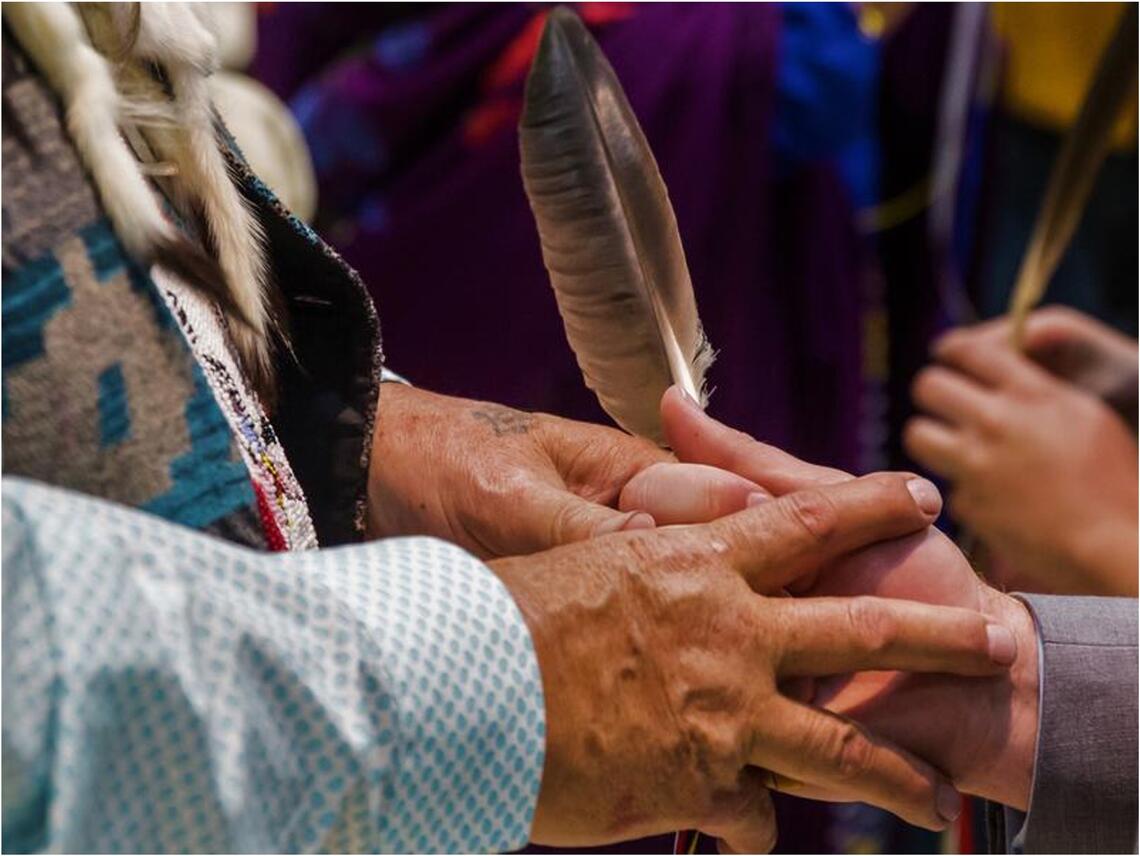Theme 3: Vulnerable to Thriving
To improve the trajectories of vulnerable children through social and structural systems, policies and programs that allow children to thrive.

Goals:
- Better monitoring of child and youth health and well-being
- Greater upstream wholistic health and well-being promotion and prevention

Walking Together on Parallel Paths
As part of One Child Every Child, we have committed to walking Parallels Paths focused of the well-being of all children.
Our Indigenous led research is done on the oral path and follows oral traditions. Our written path research programs are led by non-Indigenous researchers who follow written systems processes. Some researchers conduct projects that follow both oral and written traditions.
OCEC is exploring where these paths can cross to improve outcomes for all children.
Oral Path
Written Path
Collaboration with Dr. Michael Hart
Traditional Cree knowledge and practices: In partnership with Dr. Moss Norman at the University of British Columbia, is connecting and bringing together Elders and youth to share their perspectives on health and wellness and host a series of on the land and ceremonial gatherings to support the intergenerational transmission of Cree knowledge.
Collaboration with Dr. Marlyn Bennett
- Uniquely blend Indigenous traditions with contemporary research methods, all aimed at fostering resilience and promoting health and mental well-being among Indigenous young people in Alberta.
- This project will develop a platform to enable meaningful dialogue and engagement between students, staff, Elders, Knowledge Holders/Keepers, and Indigenous families, communities, and service providers that will encourage collaboration and strengthen intergenerational bonds.
- Committed to using digital storytelling to preserve Indigenous young people's oral stories, improve support strategies, and deepen our understanding of their health and well-being needs.
Collaboration with Dr. Michael Hart
- Working with Dr. Tabitha Martins at the University of British Columbia to understand the role that food security plays in the overall health and well-being of children and their families
- Host a series of on the land engagement sessions and community feasts
Collaboration with Dr. Jennifer Markides
- Strengthening Pathways for First Nations, Métis, and Inuit Youth Moving into Post-Secondary Education and Vocational Programs
- Continued Elder and community engagement to establish educational programs for youth
- Hosting conferences, land-based learning and cultural activities at the direction of Indigenous youth
- Scaling out the program to include more school divisions and community researchers
Collaboration with Dr. Jennifer Markides
- Intergenerational Healing and Hope through Holistic Wellbeing Education
- Establishing contracts with language and cultural instructors
Collaboration with Dr. Lindsay Crowshoe
A scoping review to synthesize and disseminate current directions in arts-based interventions for Indigenous youth that support connections and wellness, including an overview content and methods used, facilitation approaches, theoretical frameworks, and assessment methods.
Develop, pilot, and assess a music-based wellness program for urban Indigenous youth. Pilot program will culminate in community showcase, in partnership with Indigenous youth community organizations.
Additional wellness programming and initiatives will be explored, developed, piloted, and assessed as informed by literature directions, facilitation capacity, and in consideration of the Indigenous Health Program (IHP) community-engagement goals.
Potential avenues of exploration include fine art, dance, audio-visual storytelling, and literary arts.
Collaboration with Dr. Tamara Bodnar
Aiming to engage in discussions with children and families, community members, teachers, and Elders, in order to get a more informed and multigenerational understanding of wellness and elements that could lead to improved wellness in the community.
Essential to the proposed research will be to utilize Etuaptmumk, or Two-Eyed Seeing, which involves including both Indigenous knowledge and ways of knowing and Western knowledge and combining them together.
Collaboration with Dr. Pamela Roach & Dr. Jennifer Markides
This project is focused on adapting the Icelandic Prevention Model by partnering with the United Way and Miskanawah in conjunction with the broader Planet Youth research team. Indigenous-led analysis of survey data will be completed in addition to talking circles with youth and families to determine the best ways of adapting the prevention model with Indigenous youth in Calgary.
Collaboration with Dr. Jennifer Markides
- Developing an online platform for the Hub and continued student outreach and engagement
- Mapping out the current community research projects and establishing partnerships for student placements
- Working in partnership with the Indigenous Accelerator and Transdisciplinary Training Accelerator for implementing the Indigenous Research Circle
Collaboration with Dr. Grant Bruno
- Autism spectrum disorders (ASD) and intellectual developmental disorders (IDD) impact over 130,000 Albertans, including children - and prevalence rates are on the rise.
- Through a collaboration of CASA Mental Health, the University of Alberta, the University of Calgary, Alberta Health Services, and Autism Edmonton, and in alignment with the Vulnerable to Thriving Theme and Impact, Evaluation, and Knowledge Mobilization Accelerator, we will explore challenges and opportunities to expand access to genetic testing for people with ASD and IDD in our province, and develop strategies to use this genomic information to advance precision medicine interventions in mental health in an equitable way.
Kate Storey (University of Alberta)
Schools are powerful and equitable settings to address population health and are also community hubs, reaching nearly all children during critical developmental years. However, there is a need for better evidence and monitoring of healthy school communities to optimize implementation of more effective interventions. This research will inform the development, mobilization and launch of a national framework for healthy schools in Canada to provide higher level support for our nation’s schools to ensure every child can thrive.
